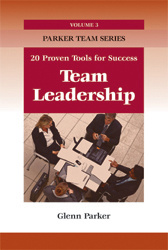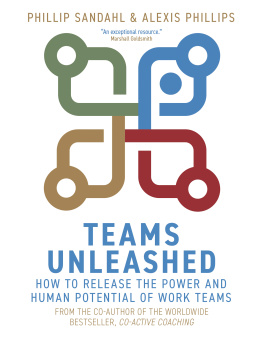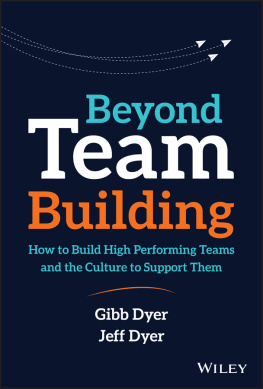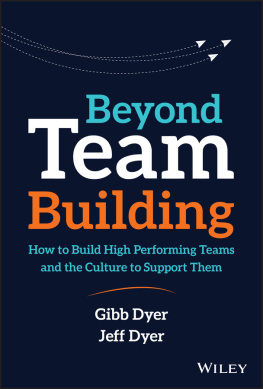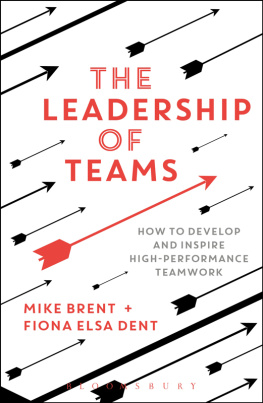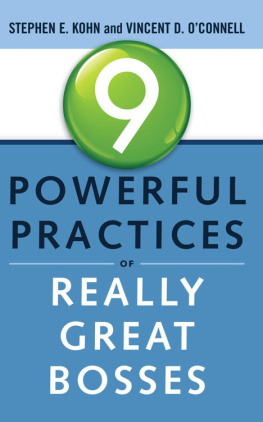9 POWERFUL PRACTICES OF REALLY GREAT TEAMS
STEPHEN E. KOHN
AND
VINCENT D. OCONNELL

All rights reserved, including without limitation the right to reproduce this ebook or any portion thereof in any form or by any means, whether electronic or mechanical, now known or hereinafter invented, without the express written permission of the publisher.
Copyright 2013 by Stephen E. Cohn and Vincent D. OConnell
Previously published as 6 Habits of Highly Effective Teams
978-1-5040-2030-5
The Career Press, Inc.
220 West Parkway, Unit 12
Pompton Plains, NJ 07444
www.careerpress.com

Distributed by Open Road Integrated Media, Inc.
345 Hudson Street
New York, NY 10014
www.openroadmedia.com

For our families and close friends who strengthen our understanding of interpersonal skills every day.
CONTENTS
Chapter 1
Introducing the 9 Powerful Practices of Really Great Bosses
Chapter 2
Powerful Practice #1: Expanding Self-Awareness
Chapter 3
Powerful Practice #2: Practicing Empathy
Chapter 4
Powerful Practice #3: Following Golden Rule Principles
Chapter 5
Powerful Practice #4: Safeguarding Credibility
Chapter 6
Powerful Practice #5: Maintaining Proper Boundaries
Chapter 7
Powerful Practice #6: Criticizing Artfully
Chapter 8
Powerful Practice #7: Adopting a Coaching Style
Chapter 9
Powerful Practice #8: Flexing to Different People Styles
Chapter 10
Powerful Practice #9: Transforming Conflict Into Opportunity
FOREWORD
The value of people skills in organizational management is widely accepted, but sometimes overlooked when companies consider, How do we get managers better at performing their supervisory roles? It might be that organizations view other, technical aspects of a managers job as more trainable. Consequently, companies gear their training toward filling gaps in knowledge about current best practices, introducing new, productivity-enhancing technology, reviewing company policy updates, and the like. Perhaps, there is an unspoken belief that managers either have interpersonal skills or they dontso the strategy is not to spend resources on people skill training but rather on hiring the right person with natural aptitudes in human relations, on placing individuals into leadership positions who can build the type of solid, productivity-enhancing relationships that benefit the organization.
Certainly, my organization and countless others like ours declare, in job postings and position descriptions, that our interest is in hiring and promoting individuals to management positions who have the sensitivity and social orientation to perform the people management aspects of the boss role effectively. And best efforts are made to select those whom we believe will succeed in this aspect of the supervisory role. But by labeling these somewhat ephemeral competencies as people skills, isnt there a tacit understanding that these are actual competencies, which can be developed? A paradigm shift might be indicated. If organizations and individuals want to improve performance in overall management practice, perhaps they should be on the lookout for guidance and direction in people skill development.
Actually, some intriguing questions arise when one considers the prospect of dedicating time and resources to learning more about the human relations aspects of management.
- What are these people skills, really?
- How do individuals get better at the people part of management, especially if it doesnt come really easy for them, because their competencies are more of a technical nature or based more on industry knowledge?
- And in working on becoming a better manager of people, how do individuals best focus their time and efforts? Where do they begin, and what should they be doing from some foundation-level, beginning point forward?
What I admire most about The 9 Powerful Practices of Really Great Bosses is that it provides real, concrete, and quite specific answers to these questions. Instead of offering nebulous platitudes or broad parables, this book gives the reader clear direction and a sensible set of suggestions about how to actually build and practice people skills.
Stephen E. Kohn and Vincent OConnell have again boiled down their guidance to leaders nicelythere are nine powerful practices of effective people management which they insist matter most. Their message fits well with organizational thinking about how to perform skill or work processes more effectively: The trick is to identify the most relevant competencies, and then to gain mastery over them. The book tells us the aptitudes that truly matter most, and how to develop them with greater proficiency.
Moreover, the book is easy to read. I like the way in which the case examples that Kohn and OConnell use ring so very true. This book is simply a great way to get grounded about the habits that help insure success in people management.
Finally, if you have picked up this book and are reading this, you are no doubt attracted to this subject matter. So, you are already on your way to building self-awarenessthe first of the nine powerful practices that Kohn and OConnell espouse. That is, you know people skills matter, and that mastery over them is a lifelong learning project. So, I encourage you to feed this curiosity about yourself. It will make you not just a more effective manager, but a more effective person in building important relationships in your life outside work, as well. Best wishes, and good luck!
Raymond G. Steitz, senior V.P., human resources, Olam Americas
PREFACE
As consultants and trainers dedicated to building emotionally intelligent human relations competencies of managers, we spend a lot of time talking to individuals in different types of organizations and in different roles within these enterprises about the issue of what it really takes to be an effective boss. Its a topic that elicits many viewpoints, which trend rather equally between two distinct yet overlapping perspectives. One involves opinions about what causes seemingly qualified leaders to fail, thereby implying that one can learn much about being an effective boss by understanding the behaviors that prevent managers from being as successful as they should be. The other involves focusing on the more positive assessment of attributes shown by bosses that staff admires most.
We are always struck by the frequency with which we hear about instances where strategically brilliant individuals or technical experts with truly superior knowledge and skills in the organizations core business fall short as leaders because of shortcomings in what is typically described as their inability to manage people. Behaviors cited to describe this rather wide spectrum of poor people management skills typically include poor approaches to interpersonal communication, impolite reactions or rudeness, micromanagement of tasks that staff are hired to be able to handle themselves, poor listening and one-sided dialogues with staff, and a fear of approaching the boss with issues because of their prior off-putting emotional reactions. Of course, there are many, many others, but in the end they all relate quite directly to diminished emotional intelligence, or EQ.


